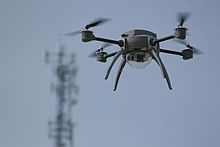The ACLU of Washington has called regulating the use of drones in our state a top legislative priority this year. And last night, the state House of Representatives came one step closer to doing just that with the 83-15 passage of HB 2789. The bill, sponsored by Rep. Roger Goodman (D – Kirkland), Chair of the House Public Safety Committee, would provide a statewide framework for the “reasonable regulation” of drones, “to prevent warrantless, suspicionless searches and fishing expeditions,” according to Goodman.
If passed by the Senate and signed into law by Gov. Jay Inslee, the bill would require state and local agencies “to obtain explicit approval from the agency’s governing body before procuring a drone,” according to a press release announcing the bill’s passage in the House.
“We are being watched, and we know it,” Goodman says. “There are cameras affixed to buildings, streets, parking lots. We don’t have a complete expectation of privacy. But we are also being watched and we don’t know it – by extraordinary sensing devices. … Unmanned aerial vehicles are game-changing technology. Not only are these an invasion of privacy under the 4th amendment to the U.S. Constitution, but also under Article I, Section 7 of our state constitution, which protects our privacy to a greater degree.”
Reached by Seattle Weekly for comment, this morning ACLU of Washington Spokesperson Doug Honig applauded the House passage of HB 2789, and called for a bipartisan effort to move the legislation into law.
“The legislature needs to act to ensure that society can have the benefits of this new technology without bringing us closer to a ‘surveillance society’ in which government tracks, records, and scrutinizes people’s movements,” Honig says via email. “The bill does not ban drones – it simply ensures that public debate happens before they are actually deployed, and it sets reasonable, common sense limits on their uses.”
Noting that the federal government has a history of providing local law enforcement agencies with money to purchase drones before local governments have weighed in or regulations have been established, or the law enforcement agencies themselves have even decided how the drones will be used (see: Seattle), Honig calls the House’s action a necessary step. “Rather than a patchwork of laws, the legislature needs to establish statewide standards for regulation,” he says.
“Our concern is that unmanned aerial drones give the government unprecedented capabilities to engage in surveillance and other activities that infringe on privacy,” Honig continues. “They do not have the physical, logistical, or economic limitations of previous methods of information collection, such as fixed camera networks or manned aerial surveillance. Their small size allows them to capture information from new vantage points. Since they are unmanned, they can operate for longer periods of time at a lower cost. And, they come equipped with new surveillance technologies, such as high resolution cameras and facial recognition, that enable them to collect very intrusive personal information.”
While HB 2789 appears to go far enough for the House and the ACLU of Washington, the effort may still find critics. Goodman’s bill fails to ban drones outright, and allows for “exceptions to preserve public safety,” according to the press release, “including imminent threats to life, natural disasters, military training and emergency response.” The press release says the effort “strikes a delicate balance between public safety and privacy protection.”
It will be interesting to see what happens from here. Last year, as the ACLU of Washington notes in its list of 2014 legislative priorities, a similar effort “was scuttled by opposition from Boeing last year.”
Speaking of Boeing and drones, check out this cover story from Seattle Weekly’s Rick Anderson which originally ran in June of last year.








